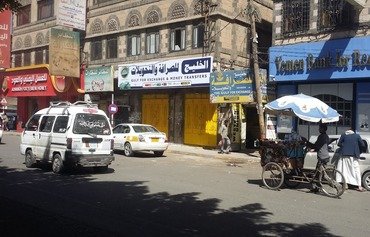Money exchange offices in Sanaa have stopped selling and buying hard currencies after the country’s riyal collapsed to an all-time low against the US dollar, economists told Al-Mashareq Friday (July 27th).
The riyal's value continues to drop at local exchange markets against foreign currencies, particularly the US dollar and Saudi riyal, with the exchange rate reaching 520 Yemeni riyals to the US dollar in Aden and 510 in Sanaa, and 140 Yemeni riyals to the Saudi riyal in Aden and 135 in Sanaa.
"We decided to stop buying or selling [hard currencies] to stop the rise of the US dollar, Saudi riyal and other currencies against the Yemeni riyal," said Abdullah al-Habla, sales manager at al-Habla Currency Exchange.
"The high demand by traders for the US dollar to cover imports was the factor behind the drop of the riyal value, particularly as the Central Bank failed to seriously intervene," he told Al-Mashareq.
Before the start of the war in 2015, the riyal's value against the US dollar was 215.
Failed fiscal policy
"The failure of the Central Bank to manage fiscal policy has been a factor in causing this accelerated rise [of hard currencies against Yemeni riyal]," Studies and Economic Media Centre president Mustafa Nasr told Al-Mashareq.
The Central Bank setting the sales price of the US dollar to importers of basic goods at 470 riyals has been a direct cause of the drop of the riyal's value, he said, noting that the dollar is being sold in the black market at 485 riyals.
"The margin of difference in selling the dollar within the black market is rather insignificant," he said, causing traders who want to purchase the dollar to cover their import bills to go to the black market because of the lengthy and complicated measures imposed by the Central Bank on them.
"Another reason for the drop in the riyal's value is that the main exchange firms are involved in speculation in the local market," Nasr added.
'Unstable exchange rates'
Wholesale traders stopped selling their products until the rates of exchange stabilise at the local market, said economist Abdul Jalil Hassan.
As a result, food prices have seen "consecutive and arbitrary hikes that are different from one place to another", he told Al-Mashareq.
The rise of hard currencies against the riyal threatens an economic collapse and aggravates people’s suffering, he said, especially as many Yemenis have not received their salaries in almost 20 months.
"This represents an economic catastrophe," Hassan said.
Saudi Arabia announced on January 17th it would transfer $2 billion to Yemen's Central Bank, following desperate calls for a financial rescue from the Yemeni government.

![A Yemeni woman sells Henneh and other products at a market in Hajjah province's northern district of Abs on July 15th. [Essa Ahmed/AFP]](/cnmi_am/images/2018/07/27/13725-Yemen-Hajjah-woman-600_384.jpg)






